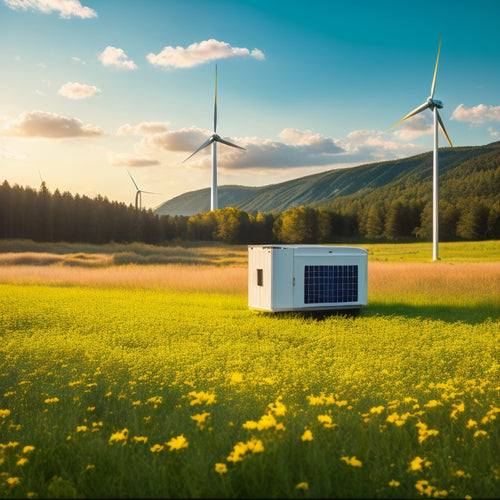
Cost to Do Solar Panels
Share
You're likely wondering how much it'll cost to switch to solar panels. The upfront investment includes panel purchase, installation, and equipment costs, but long-term savings on energy bills can offset these costs. With government incentives and tax credits, the overall cost of a solar system can be reduced. Maintenance costs are generally low, and evaluating financing options can enhance affordability. Plus, solar panels can increase your property value by up to 17%, making them a worthwhile investment. As you investigate the benefits of solar energy, you'll unveil how it can lead to significant cost savings and a reduced carbon footprint, setting you up for a sustainable future, with even more advantages waiting to be revealed.
The Essentials
- The cost of solar panels varies depending on the type, installation costs, and energy consumption, with potential for complete elimination of electricity bills.
- Government incentives, like the Solar Investment Tax Credit (ITC), enhance affordability and reduce the upfront cost of solar panels.
- Energy savings potential ranges from 5-20% reduction in energy bills, depending on the type of solar panel installed, such as monocrystalline or bifacial.
- Financing options and incentives make solar energy more accessible, with potential to increase property value by up to 17% and boost resale value.
- Efficient inverter technology is crucial for optimizing solar energy use, with higher-efficiency inverters yielding long-term savings despite higher upfront costs.
Zero Energy Bill POSSIBILITY
You can potentially save money on your electricity bill by utilizing solar energy, as it allows you to generate your own power and reduce your reliance on the grid.
By investing in Solar Power and Battery Storage solutions, you can break free from reliance on the grid and reduce your electricity bills, allowing you to reap significant cost savings while taking control of your energy needs Renewable Energy Solutions.
With solar panels, you can lower your electricity costs and even eliminate your energy bills altogether.
Energy Savings Potential
Optimism abounds when considering the energy savings potential of solar panels, as the possibility of a zero energy bill becomes a tantalizing reality. You're probably wondering how much you can save by switching to solar power. The answer depends on several factors, including the type and quality of your solar panels, installation costs, and your current energy consumption.
| Solar Panel Type | Energy Savings Potential |
|---|---|
| Monocrystalline | 10-15% reduction in energy bills |
| Polycrystalline | 8-12% reduction in energy bills |
| Thin-Film | 5-8% reduction in energy bills |
| Bifacial | 12-18% reduction in energy bills |
| High-Efficiency | 15-20% reduction in energy bills |
Keep in mind that these estimates are approximate and may vary depending on your specific circumstances. However, with the right solar panel type and installation, you can greatly reduce your energy bills and even reach a zero energy bill.
Lower Electricity Costs
As solar panels generate electricity, they directly offset your energy consumption, leading to a considerable decrease in your electricity costs. This reduction in costs can be substantial, especially if you consume a lot of energy during the day when the sun is shining.
With solar panels, you can potentially eliminate your electricity bill altogether, giving you a sense of freedom from relying on the grid. By installing solar power systems, individuals can greatly reduce their reliance on the grid and lower their monthly energy expenses Renewable Energy Solutions.
Additionally, solar power is a clean and renewable source of energy, producing no emissions or pollution, which helps mitigate climate change and protects the environment for future generations.
The amount of savings you'll experience depends on the size of your solar panel system and your energy usage patterns. However, with government incentives and solar financing options available, the cost of moving to solar energy is more accessible than ever.
For instance, the Solar Investment Tax Credit (ITC) allows you to claim a tax credit of up to 26% of the total cost of your solar panel system. Additionally, many solar financing options offer low-interest rates and flexible repayment terms, making it easier to shift to solar energy.
Increases Property Value
You'll be pleased to know that installing solar panels can greatly enhance your property worth.
In fact, studies have shown that solar panels can increase your selling price by up to 17%. This is likely due to the fact that residential solar installation not only reduces electric bills but also contributes to renewable energy.
Additionally, solar panels can be seen as a beneficial amenity, much like panels installation that adds to the overall appeal of a property.
This means that if you decide to sell your property in the future, you can expect to recoup a considerable portion of your initial investment.
Property Value Boost
Installing solar panels can greatly enhance your property's value, a benefit that's hard to ignore in today's competitive real estate market. When you invest in solar panels, you're not only reducing your carbon footprint but also increasing your property's appeal to potential buyers. This is especially important if you're planning to sell your property in the future.
Solar panels can elevate your property's resale value by up to 17%, according to the National Renewable Energy Laboratory.
The solar panel aesthetics also play a significant role in enhancing your property's value. Modern solar panels are designed to be sleek and slim, blending seamlessly into your roof's design. This means you can enjoy the benefits of solar energy without compromising your property's visual appeal.
Additionally, solar panels require minimal maintenance, which reduces the risk of future repair costs. As a result, your property becomes more attractive to potential buyers, giving you a competitive edge in the real estate market.
Higher Selling Price
How much more can you expect to sell your property for with solar panels installed? According to recent studies, you can increase your property's value by up to 4.1% with solar panels. This translates to a higher selling price, making your property more attractive to potential buyers.
In today's solar market trends, energy-efficient features are highly sought after. By installing solar panels, you're not only reducing your carbon footprint but also increasing your property's appeal. This is especially true for environmentally conscious buyers who are willing to pay a premium for eco-friendly features.
When developing your selling strategies, highlight the long-term benefits of solar panels, such as reduced energy costs and increased property value. This can be a major selling point, especially in competitive markets.
Efficient Inverter Technology Explained
You'll want to guarantee your solar panel system is equipped with an efficient inverter, as it plays a vital role in converting DC power from the panels to AC power for your home.
When selecting an inverter, consider the impact of renewable energy solutions on your energy needs and how advanced power conversion techniques can maximize your energy output.
Inverter efficiency ratings, typically measured in percentages, indicate how effectively the device can convert power while minimizing energy loss.
Inverter Efficiency Ratings
When sizing a solar panel system, one essential factor to take into account is the inverter's efficiency rating, as it markedly impacts the overall performance of the system. You want to verify that your inverter can convert DC power from the solar panels to AC power for your home or business efficiently. A higher efficiency rating means more energy is converted and less is wasted as heat.
Inverter efficiency ratings vary depending on the type and quality of the inverter. Here's a comparison of different inverter types and their typical efficiency ratings:
| Inverter Type | Typical Efficiency Rating |
|---|---|
| String Inverter | 95-97% |
| Microinverter | 96-98% |
| Power Optimizer | 97-99% |
| Central Inverter | 98-99% |
When choosing an inverter, consider not only the efficiency rating but also the inverter lifespan, which typically ranges from 10 to 25 years. A higher-efficiency inverter may cost more upfront but can provide long-term energy savings and a faster return on investment.
Advanced Power Conversion
Advanced power conversion technology is revolutionizing the solar industry by pushing inverter efficiency to new heights. As you investigate the world of solar technology advancements, you'll uncover that inverters play a critical role in converting DC power from your solar panels into usable AC power for your home. Efficient inverters are crucial to maximizing your solar energy output.
You'll want to understand how advanced power conversion works to get the most out of your solar investment. Fundamentally, high-efficiency inverters use advanced algorithms and state-of-the-art components to minimize energy losses during the power conversion process. This results in more usable power and reduced heat generation, which can increase your inverter's lifespan.
When evaluating advanced power conversion technologies, look for inverters with high power conversion efficiency ratings. A higher rating indicates that the inverter can convert more of the DC power into usable AC power. This means you'll generate more electricity and reduce your reliance on the grid.
Check Your Roof Size
You'll need to accurately measure your roof's size to determine how many solar panels you can fit and how much energy they'll produce.
When considering off-grid energy solutions, it's crucial to assess your roof's dimensions to guarantee a seamless integration with your existing energy infrastructure.
To get an accurate measurement, you'll want to take into account the roof's dimensions, including its length, width, and any obstructions like skylights or vents.
Roof Measurement Tips
Measuring your roof accurately is vital in determining the number of solar panels you'll need to install, as it directly impacts the overall cost of the system. You'll want to evaluate roof type considerations, such as asphalt shingle, metal, or tile, as each has its own unique installation requirements. Additionally, the installation angle of your roof is significant, as it affects the energy output of your solar panels.
To get an accurate measurement, you'll need to calculate the total square footage of your roof. Here's a simple formula to follow:
| Roof Section | Measurement |
|---|---|
| Length (ft) | _______ |
| Width (ft) | _______ |
| Total Sq Ft | _______ |
Multiply the length and width of each section to get the total square footage. Be sure to account for any obstructions, such as vents, skylights, or chimneys. By accurately measuring your roof, you'll be able to determine the most effective number of solar panels for your system, ensuring you get the most energy output while keeping costs in check.
Roof Obstruction Check
Now that you've calculated your roof's total square footage, it's time to assess potential obstructions that could impact your solar panel installation. Obstructions can greatly reduce the efficiency of your solar panel system, so it's crucial to identify them beforehand.
Start by examining your roof's layout and identifying any features that could cast shade on your solar panels, such as skylights, vents, or chimneys. Also, consider the solar panel orientation and how it might affect energy production. For instance, a south-facing roof receives the most sunlight, making it ideal for solar panels.
Next, inspect your roof material, as it can impact the installation process and overall cost. For example, asphalt shingles are relatively easy to work with, while metal or tile roofs may require additional labor and materials.
Additionally, consider any local building codes or regulations that might affect your installation. By identifying and addressing these potential obstructions, you can guarantee a successful and efficient solar panel installation that maximizes your energy production and freedom from utility bills.
Lower Carbon Footprint Guaranteed
You're switching to a clean energy source with solar panels, which guarantees a lower carbon footprint.
As an eco-friendly energy source, solar power reduces your reliance on fossil fuels, decreasing greenhouse gas emissions and mitigating climate change.
Eco-Friendly Energy Source
Switching to solar energy considerably reduces your reliance on fossil fuels, thereby slashing your carbon footprint and contributing to a cleaner environment. As you shift to an eco-friendly energy source, you'll reap numerous solar panel benefits. Not only do solar panels utilize renewable energy, but they also minimize your impact on the environment.
| Energy Source | Carbon Emissions | Renewability |
|---|---|---|
| Fossil Fuels | High | Non-Renewable |
| Solar Energy | Low | Renewable |
| Nuclear Energy | Low | Non-Renewable |
| Wind Energy | Low | Renewable |
Frequently Asked Questions
Do Solar Panels Work During Power Outages?
You're wondering if solar panels work during power outages. Typically, grid-tied systems shut down during outages to guarantee safety, but you can opt for a battery-backed system to maintain power, albeit with reduced solar panel efficiency.
Can I Install Solar Panels Myself?
You're a skilled builder, constructing your own energy independence, but installing solar panels yourself is like maneuvering through a complex puzzle without the right DIY installation guide and specialized solar panel tools - are you prepared to handle the challenge?
How Long Does Solar Panel Installation Take?
You're wise to contemplate the installation timeline, as it varies depending on system size and complexity. Typically, the installation process takes 1-3 days for a residential system, but can stretch to several weeks for larger commercial projects.
Do Solar Panels Increase Homeowners Insurance?
You'll find that 95% of homeowners with solar panels don't experience significant changes in insurance premiums. When you install solar panels, your policy coverage typically remains the same, as the added value is often considered minimal, and insurance companies rarely adjust premiums accordingly.
Are Solar Panels Resistant to Hail Damage?
You're wondering if solar panels can withstand hail damage. Fortunately, modern solar panels are designed to resist hail impact, thanks to their sturdy construction and tempered glass. Their solar durability is impressive, ensuring uninterrupted energy production even in harsh weather conditions.
Final Thoughts
As you weigh the cost to do solar panels, remember that the benefits far outweigh the expenses. You're not just installing a system, you're investing in a zero energy bill possibility, increased property value, and a lower carbon footprint. With efficient inverter technology and a suitable roof size, the switch to solar is a no-brainer. So, what's holding you back from utilizing the power of the sun and reaping the rewards for years to come? The future of energy is in your hands.
Related Posts
-

Top Eco-Friendly Camping Equipment for a Sustainable Adventure
When you're camping with the planet in mind, opt for eco-friendly gear like tents made from recycled materials and bi...
-

Sustainable and Eco-Friendly Generators for a Reduced Carbon Footprint
Sustainable and eco-friendly generators are perfect for cutting your carbon footprint and increasing energy efficienc...
-

Solar Powered Lights for Sustainable Home Decor
Solar-powered lights offer a stylish and eco-friendly way to enhance your home decor. They capture sunlight, converti...


